2020 Interview with Todd Howland (UN OHCHR)
페이지 정보
본문
Addressing Human Rights: From Gwangju to the UN
Interview with Todd Howland
Interviewed by Younglee HAN
We often confer respect on the basis of the job title one holds without regard to their journey to get there. Mr. Todd Howland deserves admiration for both his journey and the present work he is doing as a branch chief at OHCHR. He now holds a coveted position at the Office of the High Commissioner for Human Rights and was a critical participant of the recent World Human Rights Cities Forum (WHRCF). At WHRCF 2020, Mr. Howland was a discussant for the first plenary session of the Forum, “Human Rights Cities: Addressing Social Unrest Learning from the Historical Past.” Mr. Howland recently took the time to share with the WHRCF team and the Gwangju News not just about the incredible work he is currently doing with the OHCHR but about the path that he took to get to where he is today.
WHRCF: First of all, thank you for taking the time to conduct this interview with us. For starters, would you mind telling us a little about yourself, including your background and where you are from?
Todd Howland: I am currently the chief of the Right to Development, Sustainable Development, and Economic and Social Rights Branch of the Office of the UN High Commissioner for Human Rights (OHCHR) in Geneva. I have served as the OHCHR representative in Colombia, the Democratic Republic of Congo, and Angola. I worked in the first OHCHR field office in post-genocide Rwanda and also had a short assignment with the OHCHR in Equatorial Guinea.
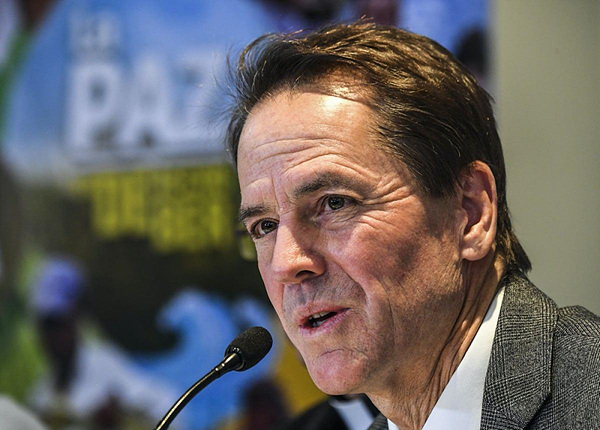
I have authored over 25 scholarly articles on human rights, including in the Human Rights Quarterly. In addition, I have published extensively on human rights in newspapers and magazines, including in the Washington Post, and LA Times.
I was also director of the Robert F. Kennedy Center for Human Rights in Washington, D.C., and I worked at El Rescate, the European Commission, and in Ethiopia for the Carter Center. I hold a juris doctorate with an emphasis in human rights law and was a visiting fellow at the Harvard Human Rights Program. I also had the good fortune to teach human rights law at Hankuk University of Foreign Studies in Seoul for two semesters.
WHRCF: How exactly did you become involved in the field of human rights? Was there a particular moment or a person who inspired you to follow this line of work?
Todd Howland: When I was growing-up in Minnesota, USA, and was about 14 years old, one of my best friends died from an environmentally caused form of bone cancer. I was old enough to start doing research on this type of environmentally caused diseases. I found that so much of this type of cancer was caused by toxics put into our environment by someone who valued money over the lives of others. This personal experience helped me to see the multiple injustices around me and motivated me to get a skill set to address them.
WHRCF: How did you first become involved in the UN human rights system? Can you tell us about that experience? It would seem like your posting overlapped with the peak of the Rwandan genocide, right?
Todd Howland: I arrived in Rwanda at the end of the genocide as part of the OHCHR’s first field operation. I had just completed an assignment for the OHCHR in Equatorial Guinea and was giving the report of my work in Geneva, when I was asked if I spoke French and whether I had an interest in joining their first field operation. I still remember hitchhiking from the airport in Kigali to the office, as not only had there been a genocide but also significant infrastructural damage, and our office was just getting off the ground and did not even have vehicles to spare.
I was put in charge of the work to help rebuild the institutions needed to uphold human rights. We did a good deal of work related to transitional justice, prisons, and policing, as well civil society. It was both a traumatic and rewarding experience to contribute at that moment in time.
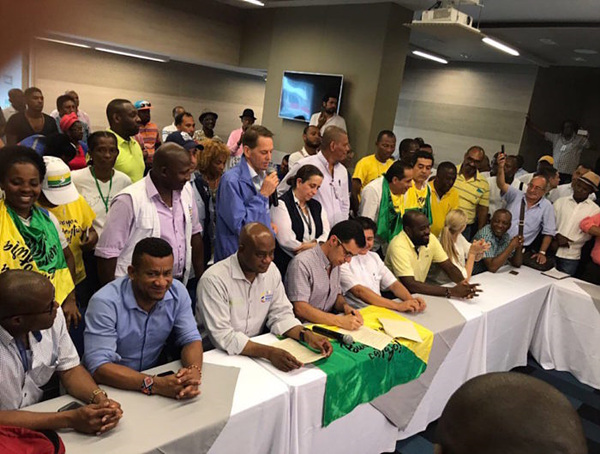
WHRCF: Tell us a little about your experience living and teaching in Korea. What are some of your most vivid memories from your time here?
Todd Howland: I enjoyed the intensity of my students and their desire to contribute to making the world a better place. They were so open to looking at things differently and to innovation and creativity. I really enjoyed working with them.
I also enjoyed playing soccer every morning with a group of Koreans that lived by the university. My Korean was very rudimentary, so I did not get to know the group very well, but they included a barber, a shop owner and a mechanic: just guys from the neighborhood. They were always so kind and continued to invite me to play in their matches on Saturdays.
WHRCF: We see that you do a lot of work with all types of students around the world. Can you speak about your views on the type of work you do with younger people, and also on why it is important to train the next generation as defenders of human rights?
Todd Howland: If we do not bother to spend time with interns or give young people a chance, we miss an opportunity to gain insight into their world, and we fail to recognize that human rights is an ongoing struggle: one that can take generations to achieve the positive changes we seek.
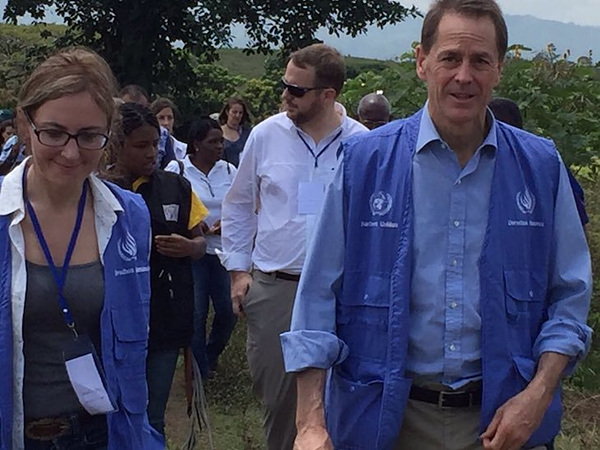
WHRCF: COVID-19 has completely changed the global landscape. Can you speak briefly about promoting human rights during this global pandemic?
Todd Howland: Beyond the health emergency, COVID-19 is a profound human crisis, deeply rooted in discrimination and inequalities. Cities are bearing the brunt of the crisis – with 90 percent of reported cases being in cities, many with strained health systems, inadequate water and sanitation services, and other challenges. This is especially the case in poorer areas, where the pandemic has exposed deeply rooted inequalities.
At the Human Rights Council session in September 2020, the high commissioner stated that human rights principles, norms, and actions offer effective solutions to build stronger resilience to shocks and counter despair by preventing social, economic, and political instability. There is an urgent need to rethink and transform cities to respond to the COVID-19 pandemic and to recover better by building more resilient, inclusive, and sustainable cities that respect and protect the rights of all its residents.
WHRCF: In regard to Gwangju’s World Human Rights Cities Forum, can you talk about the importance of instilling a culture of human rights at the local/city level? Some of the world thinks of the UN as a “nation-based” institution, but what role does the OHCHR have in forwarding principles of human rights at a local level?
Todd Howland: In the international human rights law framework, central government has the primary responsibility for the promotion and protection of human rights. But local government has an important complementary role to play. Central governments should provide information to local governments on human rights and the state’s obligations. This includes ensuring local laws, policies, and programs should be based on human rights norms and standards. Local governments should undertake self-assessments to monitor compliance with human rights. They should be encouraged to explore innovative ways of implementing human rights at the local level, adopting evidence-based laws, policies, and programs.
Local governments should be increasingly involved in the work of regional and international human rights mechanisms, and in implementing relevant recommendations. Local governments should be more engaged in both preparations for and participation in state delegations attending sessions of the Working Group on the Universal Periodic Review and the treaty bodies.
More effort is needed to train local government officials and local actors on human rights, including on how to incorporate human rights protection into all levels of governance. The OHCHR is pleased to collaborate with the newly established Gwangju International Human Rights Education Center and share our experience and technical advice in promoting human rights education together with other partners such as UNESCO and the Raoul Wallenberg Institute for Human Rights and Humanitarian Law.
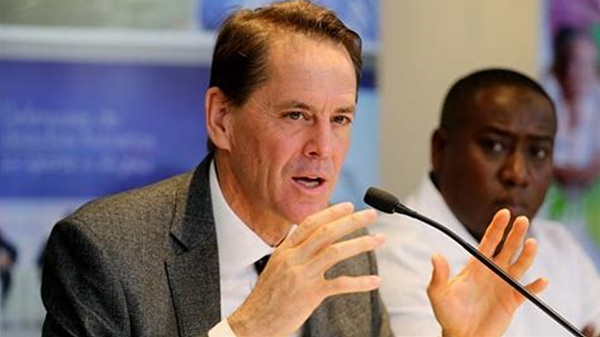
WHRCF: The upcoming forum will be Gwangju’s tenth annual WHRCF. Over the past decade, the forum has grown in funding allocated towards it and in international participation. What contribution, in your opinion, has the forum made in the promotion of human rights in Korea and internationally?
Todd Howland: The OHCHR has been participating in the WHRCF for many years. At this important milestone of the tenth anniversary of the forum, and the 40th anniversary of the Gwangju Uprising, we are especially pleased to be one of the co-sponsors of the forum and have the high commissioner as a keynote speaker at the opening session. We think that the forum has, over the last ten years, contributed significantly to catalyzing the human rights cities movement and elevating it to the global level. I think the leadership of Mayor Lee and the efforts and commitment by the citizens of Gwangju, present and past, to transform the suffering caused by human rights violations from oppressive violence in the past into upholding today’s universal values of human rights, have been critical to the success of the forum.
WHRCF: We understand you are heavily involved in the preparation of Plenary Session 1, Addressing Social Unrest: Learning from the Historical Past. Can you give us a sneak preview of what to expect in this session and share your thought process in setting it up?
Todd Howland: I have worked in a number of countries for the OHCHR. Social unrest is probably one of the most challenging aspects of our work. Too often, we in the UN shy away from protests for fear of the response of governments. But it is our job to remind governments that protest is a normal form of political participation and that the state has obligations during the protests. Often, protests arise due to underlying human rights violations. In each country where I have worked, I have tried to bring the protestors and governments together to discuss the underlying human rights violations as a means to limit tensions and find a durable solution.
Mayors can play such an important role in addressing ongoing protests by meeting with protestors and taking seriously their demands, or they can greatly exacerbate tensions. Following protests, it is critical for mayors to address the root causes of the protests and seek to remedy any state violations committed during the protests. It is a constant process to learn from the past and improve the level of respect for the future. The panel will help us learn from the experience of various mayors who have had to deal with complex issues related to past protests.
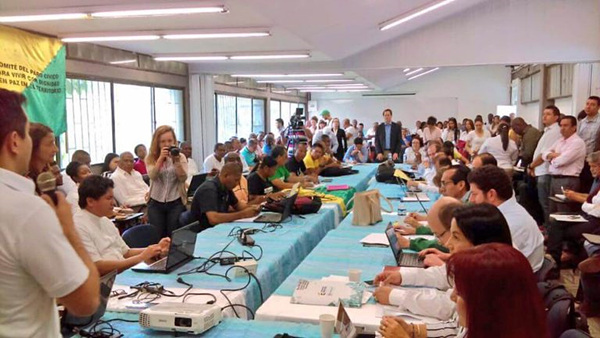
WHRCF: Thank you, Mr. Howland, for your time for this interview and for your participation in this year’s WHRCF.
Concluding Note: The World Human Rights Cities Forum is, of course, the byproduct of the awe-inspiring individuals who invest their time to share their knowledge with other human rights activists, politicians, community members, dreamers, etc. who believe in sharing their experiences for the benefit of a safer and more inclusive world. While Mr. Howland and the other participants in this year’s forum were able to fulfill these ambitions against the COVID-induced Zoom-webinar backdrop, we look forward to meeting Mr. Howland and all of our other extraordinary contributors next year in Gwangju for WHRCF 2021.
Photographs courtesy of Todd Howland
THE INTERVIEWER
Younglee HAN is a long-time coordinator at the Gwangju International Center and has managed logistics for the World Human Rights Forum for the last four years. She loves long walks in the countryside so long as there is a plate of seafood waiting for her at the end. Younglee is an avid dancer and a believer in the human spirit.
※ This article was originally published in Gwangju News November 2020 issue.
Gwangju News is the first public English monthly magazine in Korea, first published in 2001 by Gwangju International Center. Each monthly issue covers local and regional issues, with a focus on the stories and activities of the international residents and communities.
▶ Read our magazine online at www.gwangjunewsgic.com
※ Copyright by Gwangju International Center. All rights reserved. No part of this website content covered by this copyright may be reproduced in any form or by any means – graphic, electronic, mechanical, photocopying, recording or otherwise – without the written consent of the publisher.
- previousThinking Globally, Acting Locally (Mayor Marte Mjøs Persen) 20.11.23
- nextLetter from Morten Kjærum (Director of RWI) 20.10.22

